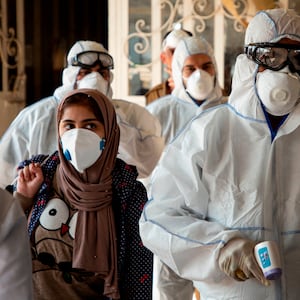MOSCOW—Before the Chinese city of Wuhan shut down last month and sank into tragic gloom, the Russian government tried to convince all its citizens in that epicenter of the coronavirus epidemic to get out. But not everybody listened.
Among those who decided to stay were several Russian fashion models who’d first come to work in Wuhan, a major industrial city, last August.
The local modeling agencies they’d signed up with closed down in early February, and there was no work left for the four. Still, spring was on the way. Like the flu season, the coronavirus season would pass, they thought.
Now it’s apparent that’s wishful thinking (even if U.S. President Donald Trump has indulged in it). In fact, nobody knows how or when this crisis will end.
The young women liked Wuhan, which is built on the banks of the Yangtze River and is dotted with many small lakes. In the early days of the epidemic, the bored models were posing for pictures on the deserted streets. Sometimes their selfies showed them in funky T-shirts and their black medical masks. Instagram fans found the pictures entertaining.
It was all fun and games until it was not. “One day you enjoy the beautiful views of the lake, on other days you sit at home with closed windows and hopes that all this will soon end,” read one of their Instagram posts. News kept coming of deaths by the hundreds.
The models, who looked like they’d been picked by central casting for some sort of reality-TV show, sat down for a brainstorming session. There was Evy Gavrilioti, with honey-colored hair; Tanya, a blonde; Olesya, a brunette; and Nadezhda “Nadia” Kochetova, who sometimes went with red hair, sometimes strawberry blond.
(Since two of the four declined to give their family names, we’ll refer to all of them here by their first names.)
Evy, Tanya, and Olesya preferred to stay in China rather than go back to freezing cold Russia. “At least China is a more developed country,” Evy told The Daily Beast in a recent phone interview. “Chinese doctors know how to treat coronavirus, so we thought we would be better off here than quarantined in some Soviet sanatorium.” They also had the (erroneous) impression, she said, that “this virus mostly affects Asian people, we should be OK.”
Her friends Tania and Olesya discussed the situation with their families, too, and also made a decision to wait for the end of the epidemic in China.
Nadia, for her part, decided to take one of the two military transports sent to Wuhan for the evacuation. “A trip I will remember for a long time,” she wrote on Instagram Feb. 5, with a photo through the cargo doors of the snowy Russian landing strip.
But she wasn’t going back home.
“Until we all got to the airport, we thought we would go to the the Moscow region, but then it turned out we were flying to Tyumen, a city in Siberia,” Nadia told The Daily Beast.
The 128 Russians on the evacuation flights that landed in Tyumen were from 44 Russian towns, but they were all doomed to spend two weeks behind locked doors, waiting to hear the results of their tests.
Volunteers gave the arrivals T-shirts that said, with what was supposed to be humorous irony: “In Siberia By My Own Will.” (Nadia wore them on several Instagram posts.) The reference was to millions of prisoners sent to Siberia very much against their will in the past. Under the circumstances, the joke didn’t seem so funny.
Early last month, Russia closed the 2,615-mile land border with China as best it could. All flights from China to Russia were canceled, neither Chinese businessmen nor tourists were allowed into the country. As soon as officials reported the first two cases of coronavirus inside Russia on Feb. 18, people hurried to buy medical masks and hand sanitizers.
Earlier, a resident of St. Petersburg with coronavirus symptoms escaped from a hospital. The woman refused to spend two weeks in an isolation ward after she tested negative for the virus. But she was caught and sent back.
Tyumen was chosen for quarantined returnees from Wuhan for a reason, and not only for its remote location among vast oil fields. The city is a microcosm of President Vladimir Putin’s ideal Russia: comfortable, loyal, militarized and free of voices criticizing the Kremlin’s policy. Moscow trusts Tyumen and Tyumen demonstrates order and loyalty to Moscow.
When one Chinese woman student there was hospitalized with coronavirus on New Year’s Eve, the city immediately put out a list of symptoms on outdoor LED screens: fever, cough, shortness of breath, headache, sore throat.
The epidemic is on everybody’s mind. A petition signed by 17,000 people in Tyumen asks the authorities to close universities and colleges.
Meanwhile, Nadia’s friends who stayed in Wuhan continue to hope their lives can go back to normal, but the epidemic turned into a much more serious disaster than they expected.
Now a month into the lockdown, there are still no people on the streets in Wuhan. Evy, Olesya, and Tania pass their days checking news online and cooking.
“Until recently we could go shopping at a local supermarket three times a week, but today our security guard refused to let us out,” Evy told The Daily Beast on Wednesday of last week. “We have some chicken and eggs in the fridge but we are running out of bottled water.”
The women do not speak Chinese but there is one English word they hear every day: “quarantine.” And somebody has told them what that is supposed to mean in China: Violators of the quarantine concealing travel history, intentionally hiding, or misreporting their symptoms could be sentenced to 10 years of imprisonment. Sometimes they hear the penalties can include life imprisonment, or death. They don’t really know. But they’re not tempting fate, or the Chinese state.
In the evenings, the models can see another apartment block—all windows are lit, nobody goes outside. There is a school near their building; it has been closed, mothers keep all their children indoors.
Their friends from Russia emailed them news about people fighting over coronavirus treatment at Wuhan hospitals, medical personnel falling victim, sick people dropping dead on the streets, police dragging people with symptoms out of their apartments.
But the models have not witnessed any of that chaos.
Russian television mentioned them in a show about the epidemic, but the reaction was the opposite of what they expected. “It was a different kind of nightmare,” said Evy. “We got ugly, hateful comments on social media from Russia, people wishing us to die, insulting us for going to work in China, labeling us as ‘escorts.’”
In Siberia, Nadia also got hateful comments on social media. A typical troll, one “Voitenko1907,” claimed to be furious that the model was supported with the money of Russian taxpayers. “We have been feeding you, slut, on our taxes and now you want an airplane to go home; nothing for you, you will spend nights at the railway station—that is the right spot for you.”
Nadia said that was not the worst attack. “My friends who were evacuated from Wuhan with me received death threats.”
Nadia was released from quarantine last week, and her agency in Rostov-on-Don, Gosh Models, looks forward to having her back.
“We brought Nadezhda up for four years,” said agency owner Yulia Vasichkina. “She is a talented and hard-working model with a big future.” Nadia’s photographs have appeared in several magazines in the south of Russia and she was well known on Rostov’s runways. “We assign our models to work abroad,” Vasichkina said. “Nadezhda went to China twice and both times Chinese agencies were pleased with her work.”
Olesya, Evy, and Tanya, still in Wuhan, say they have not despaired. Their Chinese friends are very good to them, they say. Somebody brought water for them on Friday. “I like China and its people,” Evy said. “One day I am going to write about this Groundhog Day life in the time of coronavirus.”







